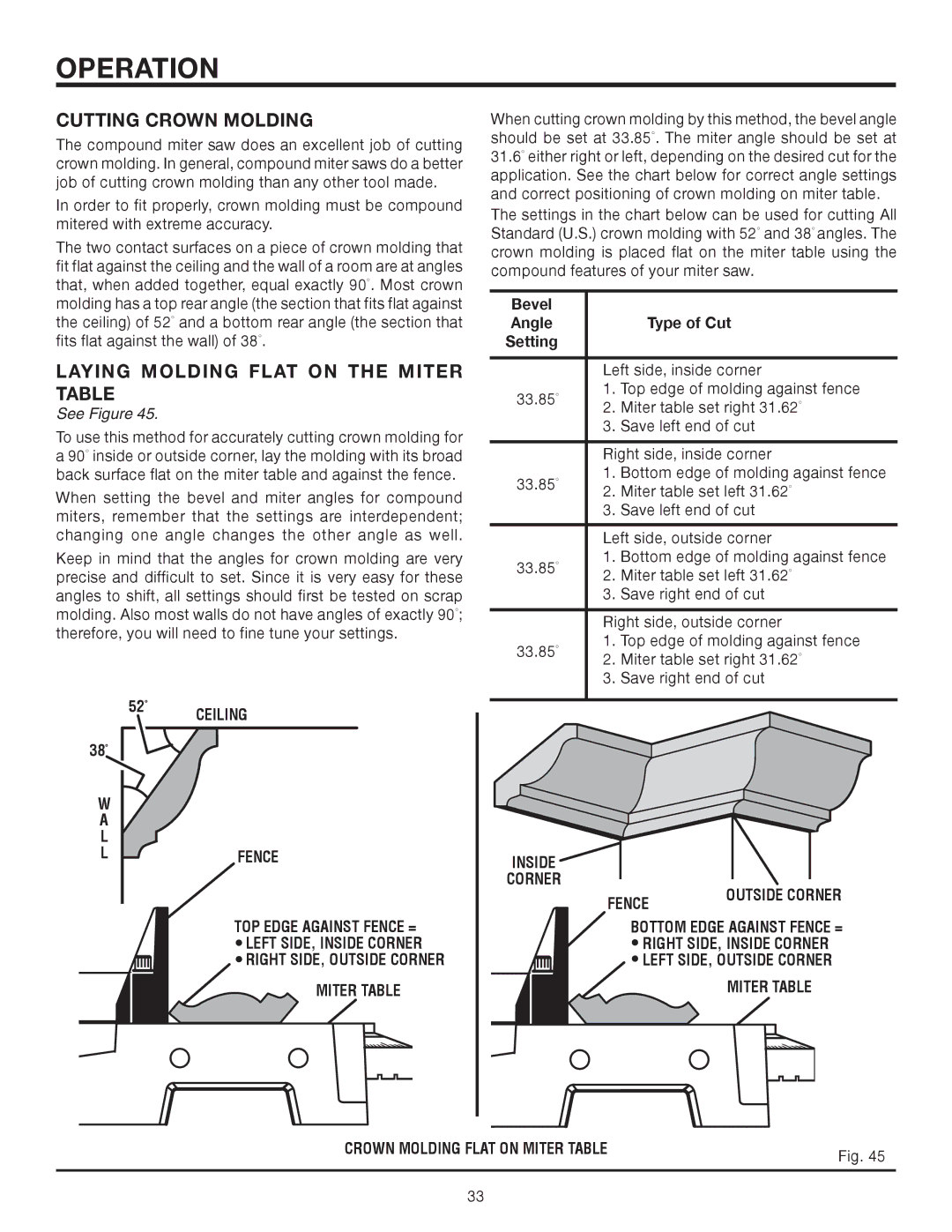
OPERATION
CUTTING CROWN MOLDING
The compound miter saw does an excellent job of cutting crown molding. In general, compound miter saws do a better job of cutting crown molding than any other tool made.
In order to fit properly, crown molding must be compound mitered with extreme accuracy.
The two contact surfaces on a piece of crown molding that fit flat against the ceiling and the wall of a room are at angles that, when added together, equal exactly 90°. Most crown molding has a top rear angle (the section that fits flat against the ceiling) of 52° and a bottom rear angle (the section that fits flat against the wall) of 38°.
LAYING MOLDING FLAT ON THE MITER TABLE
See Figure 45.
To use this method for accurately cutting crown molding for a 90° inside or outside corner, lay the molding with its broad back surface flat on the miter table and against the fence.
When setting the bevel and miter angles for compound miters, remember that the settings are interdependent; changing one angle changes the other angle as well.
Keep in mind that the angles for crown molding are very precise and difficult to set. Since it is very easy for these angles to shift, all settings should first be tested on scrap molding. Also most walls do not have angles of exactly 90°; therefore, you will need to fine tune your settings.
| 52° | CEILING |
|
| |
38° |
|
|
W |
|
|
A |
|
|
L |
|
|
L |
| FENCE |
TOP EDGE AGAINST FENCE =
![]() LEFT SIDE, INSIDE CORNER
LEFT SIDE, INSIDE CORNER
![]() RIGHT SIDE, OUTSIDE CORNER
RIGHT SIDE, OUTSIDE CORNER
MITER TABLE
When cutting crown molding by this method, the bevel angle should be set at 33.85°. The miter angle should be set at 31.6° either right or left, depending on the desired cut for the application. See the chart below for correct angle settings and correct positioning of crown molding on miter table.
The settings in the chart below can be used for cutting All Standard (U.S.) crown molding with 52° and 38° angles. The crown molding is placed flat on the miter table using the compound features of your miter saw.
Bevel |
|
|
|
|
Angle |
|
|
| Type of Cut |
Setting |
|
|
|
|
|
|
|
| |
|
|
| Left side, inside corner | |
33.85° |
| 1. | Top edge of molding against fence | |
|
| 2. Miter table set right 31.62° | ||
|
| 3. | Save left end of cut | |
|
|
|
| |
|
|
| Right side, inside corner | |
33.85° |
| 1. | Bottom edge of molding against fence | |
|
| 2. Miter table set left 31.62° | ||
|
| 3. | Save left end of cut | |
|
|
|
| |
|
|
| Left side, outside corner | |
33.85° |
| 1. | Bottom edge of molding against fence | |
|
| 2. Miter table set left 31.62° | ||
|
| 3. | Save right end of cut | |
|
|
|
| |
|
|
| Right side, outside corner | |
33.85° |
| 1. | Top edge of molding against fence | |
|
| 2. Miter table set right 31.62° | ||
|
| 3. | Save right end of cut | |
|
|
|
|
|
|
|
|
|
|
INSIDE 
CORNER
FENCE | OUTSIDE CORNER |
|
BOTTOM EDGE AGAINST FENCE =
![]() RIGHT SIDE, INSIDE CORNER
RIGHT SIDE, INSIDE CORNER
![]() LEFT SIDE, OUTSIDE CORNER
LEFT SIDE, OUTSIDE CORNER
MITER TABLE
CROWN MOLDING FLAT ON MITER TABLE | Fig. 45 |
|
33
